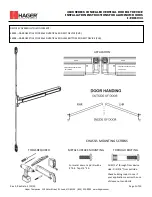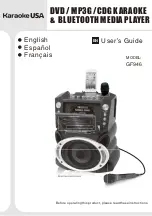
36
FAQs, GENERAL INFORMATION & OPERATING TIPS
What about units using well water?
An adequate water supply to the unit is very important. Do not let anyone disrupt the water supply by rerouting the supply
line or tapping into it without fi rst checking with your WaterFurnace dealer. If the well pumping system requires service or
is inoperable, your unit should be turned off or placed into emergency heat until an adequate water supply is restored.
Depending on the water quality, some maintenance is usually required with a well water system. Because of miner-
als and other particles in the water, without a routine of preventive maintenance, this material may eventually begin
to clog the heat exchanger in the unit. When this happens, the effi ciency and capacity of the unit is decreased,
eventually to the point where failure may occur.
To minimize the potential of this happening, a heat exchanger cleaning schedule should be established with your
dealer. The frequency will depend on the specifi c quality of your well water. Some homeowners fi nd that they can
go a few years between cleanings; others may need to have the heat exchanger cleaned yearly. In order to achieve
optimum performance, energy savings and long system life, it is necessary to have your dealer perform this service
as needed. Remember-- preventive maintenance is less expensive than replacing major components.
The cleaning procedure requires special equipment and chemicals. Therefore, do not attempt to clean the heat
exchanger yourself.
Why does the unit run more/longer than a gas furnace?
The amount or percentage of time that your unit is actually heating or cooling is called Run Time. To achieve maxi-
mum comfort during heating, geothermal systems will typically have a longer run time than a natural gas or propane
furnace. That’s because geothermal systems will deliver a more moderate air temperature instead of the hot blast of
air from a gas furnace.
Fossil fuel forced air heating systems will typically have short run times—a lot of high temperature air for a few min-
utes, followed by a cooling off period, then another blast of hot air, and on and on. This type of operation results in
ever-changing indoor temperatures and hot/cold spots within the home. This frequent cycling causes wear and tear
on a gas furnace.
Your geothermal system will most likely run for longer periods of time than a gas furnace. It’s designed to do just
that. You’ll get improved comfort and minimize hot/cold spots. And these longer run hours actually help to increase
effi ciency and reduce wear and tear associated with frequent starting and stopping. It’s like driving your car in the
city vs. the highway. The frequent starting and stopping of city driving causes more wear and tear than highway driv-
ing. And you achieve more miles per gallon (better effi ciency) on the highway with fewer stops and starts. The same
principle holds true with your geothermal system.
How is the unit sized for my home?
Your system has been designed to meet the heating and cooling requirements of your home based on your local
weather. Each home is different, so calculations are performed to ensure that the unit size is the optimum selection.
These calculations are based on square footage, insulation, windows, doors, infi ltration, outdoor weather extremes,
and many other factors. If the unit were undersized and unable to meet the heating requirements on a very cold day,
you would notice a drop in indoor temperature. In addition, the unit would consume more energy than is necessary.
If the unit were undersized and unable to meet the cooling requirements on a very hot day, you would notice that
the indoor temperature may not ever reach the setpoint on the thermostat. Conversely, units that are oversized with
too much capacity may result in short cycle times which may adversely affect comfort in both heating and cooling.
Oversized units would result in poor dehumidifi cation during cooling.
Heating systems are measured by BTU capacity per hour. Cooling systems are measured by “Tons” (which is also
BTU capacity). One BTU is the amount of energy required to raise 1 lb. of water 1 degree F—it’s roughly equivalent
to the amount of heat given off by a wooden kitchen match burned end to end. In air conditioning terms, a “ton” is
12,000 BTUs/hr.
















































